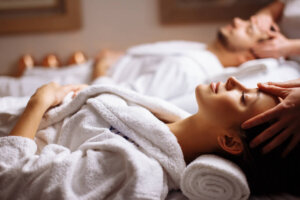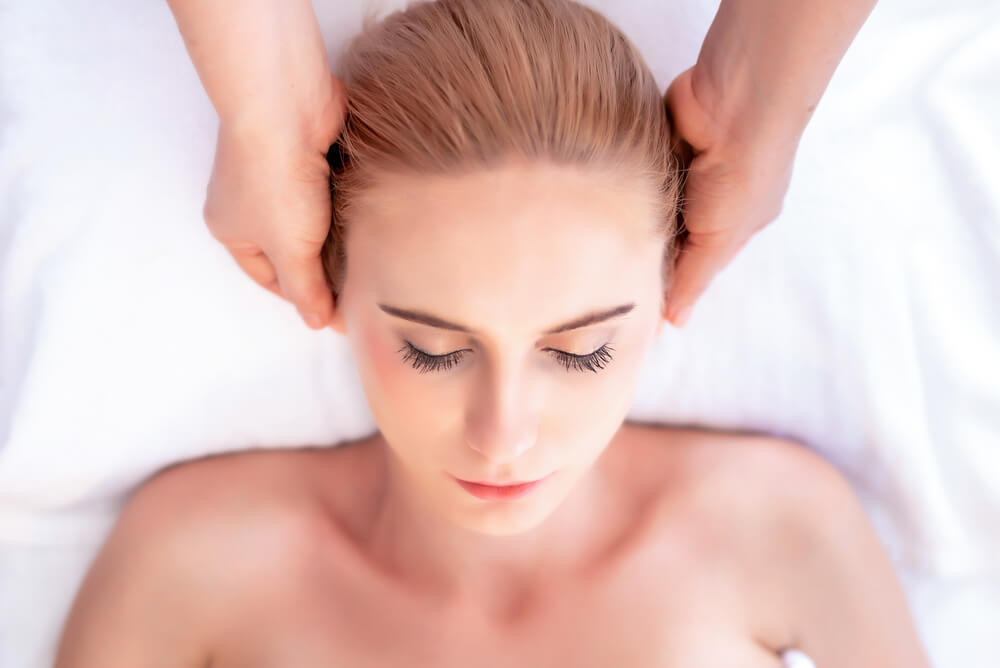The 7 Benefits of Spas for the Body

Spa centers have become popular in recent decades. However, this is an age-old practice, one that we can even trace back to Ancient Greece. The term comes from the Belgian city of Spa, famous since Roman times for its baths. Companies that offer these services claim that there are dozens of benefits of spas for our bodies. How true is this and what do the experts say? Let’s take a look.
The services you can receive in a spa are very varied. Sauna, hydromassage, exfoliation with salts, natural face and body masks, hair removal, aromatherapy, and reflexology are just some of the therapies currently offered. We’ll take a look at the benefits that are claimed and measure them up to current scientific knowledge.
7 benefits of the spas for the body
Most people go to a spa to relax. This is perhaps the main incentive to use them, although, in practice, there are many benefits of spas for the body. We’ll analyze 7 of them today.
1. Relieving stress
A paper published in the International Journal of Biometeorology in 2018 found that balneotherapy and spa therapy have the potential to influence cortisol levels in healthy people, resulting in stress relief.
2. Improving sleep quality

Studies and research have confirmed the use of the therapies included in spa services to improve sleep quality. The benefits are perceived in the short term, and can be very useful to address problems such as insomnia. It’s a strategy that, along with others, can help avoid dependence on medication to get to sleep.
3. Regulates blood pressure and blood circulation
This is one of the benefits of spas that we can obtain through one of its most popular therapies: the sauna. There’s evidence that regular dry sauna bathing can help improve heart rate, skin blood flow, and cardiac output.
It can therefore be useful for people who suffer from cardiovascular disease, although its effects are moderate and don’t replace in any way the observations and treatment prescribed by a specialist.
4. Helps the body release dopamine
A study published in the North American Journal of Medicine & Science in 2014 found that hydrotherapy sessions can increase plasma norepinephrine and dopamine concentrations by 530% and 250%, respectively. The temperature of the water and other factors affect the amount released of these hormones. The relaxing effect that everyone associates with spas is due to this.
5. It can improve back pain
Back pain affects millions of people around the world. It’s a condition that can prevent people from carrying out their different day to day activities.
A systematic review published in Medicine in 2019 suggested that spa therapy may help reduce pain and improve the functioning of the lumbar spine in people with low back problems. The results are much more powerful when combined with other available therapies.
6. Improves the appearance of the skin

When a person thinks about the benefits of spas for the body, they often do so in relation to the effects on the skin. Experts endorse these effects, so spa services can complement other therapies to address skin diseases.
For example, psoriasis, atopic dermatitis, pruritus, and acne. The effects are moderate, but they can be an option when progress isn’t made by other traditional means.
7. Supports the rehabilitation of musculoskeletal diseases
Some conditions such as arthritis, rheumatic arthritis, and ankylosing spondylitis can improve their symptoms by going to the spa. Specialists have found promising results, in principle when the sessions are carried out over long periods of time.
Despite all these benefits of spas, it’s imperative to point out that the effects are always moderate. Some companies promote packages of this type ensuring almost miraculous results. The evidence supports some of these, but in no case are they a substitute for treatment or recommendations in daily habits suggested by a medical specialist.
Similarly, we recommend you only resort to approved centers that comply with hygiene conditions. Respiratory or skin infections are the order of the day when some basic precepts are neglected.
Finally, consult with your doctor about the possibility of including therapies of this type as an adjunct to treatment for an underlying condition.
Spa centers have become popular in recent decades. However, this is an age-old practice, one that we can even trace back to Ancient Greece. The term comes from the Belgian city of Spa, famous since Roman times for its baths. Companies that offer these services claim that there are dozens of benefits of spas for our bodies. How true is this and what do the experts say? Let’s take a look.
The services you can receive in a spa are very varied. Sauna, hydromassage, exfoliation with salts, natural face and body masks, hair removal, aromatherapy, and reflexology are just some of the therapies currently offered. We’ll take a look at the benefits that are claimed and measure them up to current scientific knowledge.
7 benefits of the spas for the body
Most people go to a spa to relax. This is perhaps the main incentive to use them, although, in practice, there are many benefits of spas for the body. We’ll analyze 7 of them today.
1. Relieving stress
A paper published in the International Journal of Biometeorology in 2018 found that balneotherapy and spa therapy have the potential to influence cortisol levels in healthy people, resulting in stress relief.
2. Improving sleep quality

Studies and research have confirmed the use of the therapies included in spa services to improve sleep quality. The benefits are perceived in the short term, and can be very useful to address problems such as insomnia. It’s a strategy that, along with others, can help avoid dependence on medication to get to sleep.
3. Regulates blood pressure and blood circulation
This is one of the benefits of spas that we can obtain through one of its most popular therapies: the sauna. There’s evidence that regular dry sauna bathing can help improve heart rate, skin blood flow, and cardiac output.
It can therefore be useful for people who suffer from cardiovascular disease, although its effects are moderate and don’t replace in any way the observations and treatment prescribed by a specialist.
4. Helps the body release dopamine
A study published in the North American Journal of Medicine & Science in 2014 found that hydrotherapy sessions can increase plasma norepinephrine and dopamine concentrations by 530% and 250%, respectively. The temperature of the water and other factors affect the amount released of these hormones. The relaxing effect that everyone associates with spas is due to this.
5. It can improve back pain
Back pain affects millions of people around the world. It’s a condition that can prevent people from carrying out their different day to day activities.
A systematic review published in Medicine in 2019 suggested that spa therapy may help reduce pain and improve the functioning of the lumbar spine in people with low back problems. The results are much more powerful when combined with other available therapies.
6. Improves the appearance of the skin

When a person thinks about the benefits of spas for the body, they often do so in relation to the effects on the skin. Experts endorse these effects, so spa services can complement other therapies to address skin diseases.
For example, psoriasis, atopic dermatitis, pruritus, and acne. The effects are moderate, but they can be an option when progress isn’t made by other traditional means.
7. Supports the rehabilitation of musculoskeletal diseases
Some conditions such as arthritis, rheumatic arthritis, and ankylosing spondylitis can improve their symptoms by going to the spa. Specialists have found promising results, in principle when the sessions are carried out over long periods of time.
Despite all these benefits of spas, it’s imperative to point out that the effects are always moderate. Some companies promote packages of this type ensuring almost miraculous results. The evidence supports some of these, but in no case are they a substitute for treatment or recommendations in daily habits suggested by a medical specialist.
Similarly, we recommend you only resort to approved centers that comply with hygiene conditions. Respiratory or skin infections are the order of the day when some basic precepts are neglected.
Finally, consult with your doctor about the possibility of including therapies of this type as an adjunct to treatment for an underlying condition.
- Antonelli M, Donelli D. Effects of balneotherapy and spa therapy on levels of cortisol as a stress biomarker: a systematic review. Int J Biometeorol. 2018 Jun;62(6):913-924.
- Bai R, Li C, Xiao Y, Sharma M, Zhang F, Zhao Y. Effectiveness of spa therapy for patients with chronic low back pain: An updated systematic review and meta-analysis. Medicine (Baltimore). 2019 Sep;98(37):e17092.
- Bernetti A, Mangone M, Alviti F, Paolucci T, Attanasi C, Murgia M, Di Sante L, Agostini F, Vitale M, Paoloni M. Spa therapy and rehabilitation of musculoskeletal pathologies: a proposal for best practice in Italy. Int J Biometeorol. 2020 Jun;64(6):905-914.
- Cacciapuoti S, Luciano MA, Megna M, Annunziata MC, Napolitano M, Patruno C, Scala E, Colicchio R, Pagliuca C, Salvatore P, Fabbrocini G. The Role of Thermal Water in Chronic Skin Diseases Management: A Review of the Literature. J Clin Med. 2020 Sep 22;9(9):3047.
- Hachul H, Oliveira DS, Bittencourt LR, Andersen ML, Tufik S. The beneficial effects of massage therapy for insomnia in postmenopausal women. Sleep Sci. 2014 Jun;7(2):114-6.
- Hussain J, Cohen M. Clinical Effects of Regular Dry Sauna Bathing: A Systematic Review. Evid Based Complement Alternat Med. 2018 Apr 24;2018:1857413.
- Mooventhan A, Nivethitha L. Scientific evidence-based effects of hydrotherapy on various systems of the body. N Am J Med Sci. 2014 May;6(5):199-209.
- Sekine M, Nasermoaddeli A, Wang H, Kanayama H, Kagamimori S. Spa resort use and health-related quality of life, sleep, sickness absence and hospital admission: the Japanese civil servants study. Complement Ther Med. 2006 Jun;14(2):133-43.
Este texto se ofrece únicamente con propósitos informativos y no reemplaza la consulta con un profesional. Ante dudas, consulta a tu especialista.







